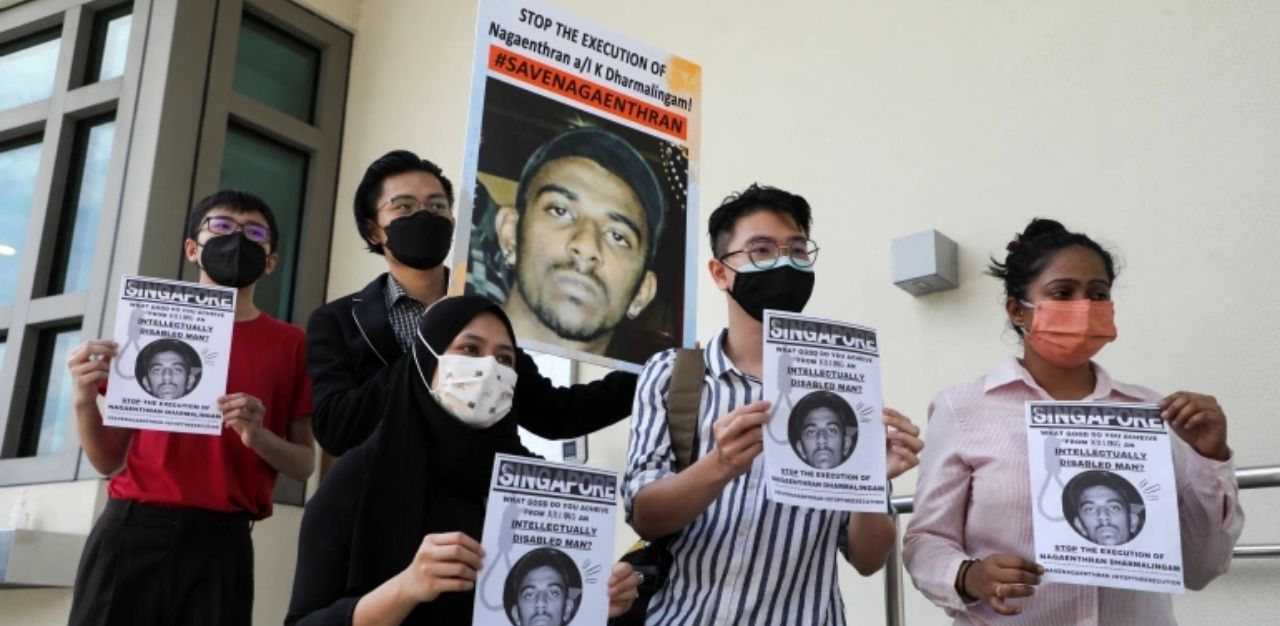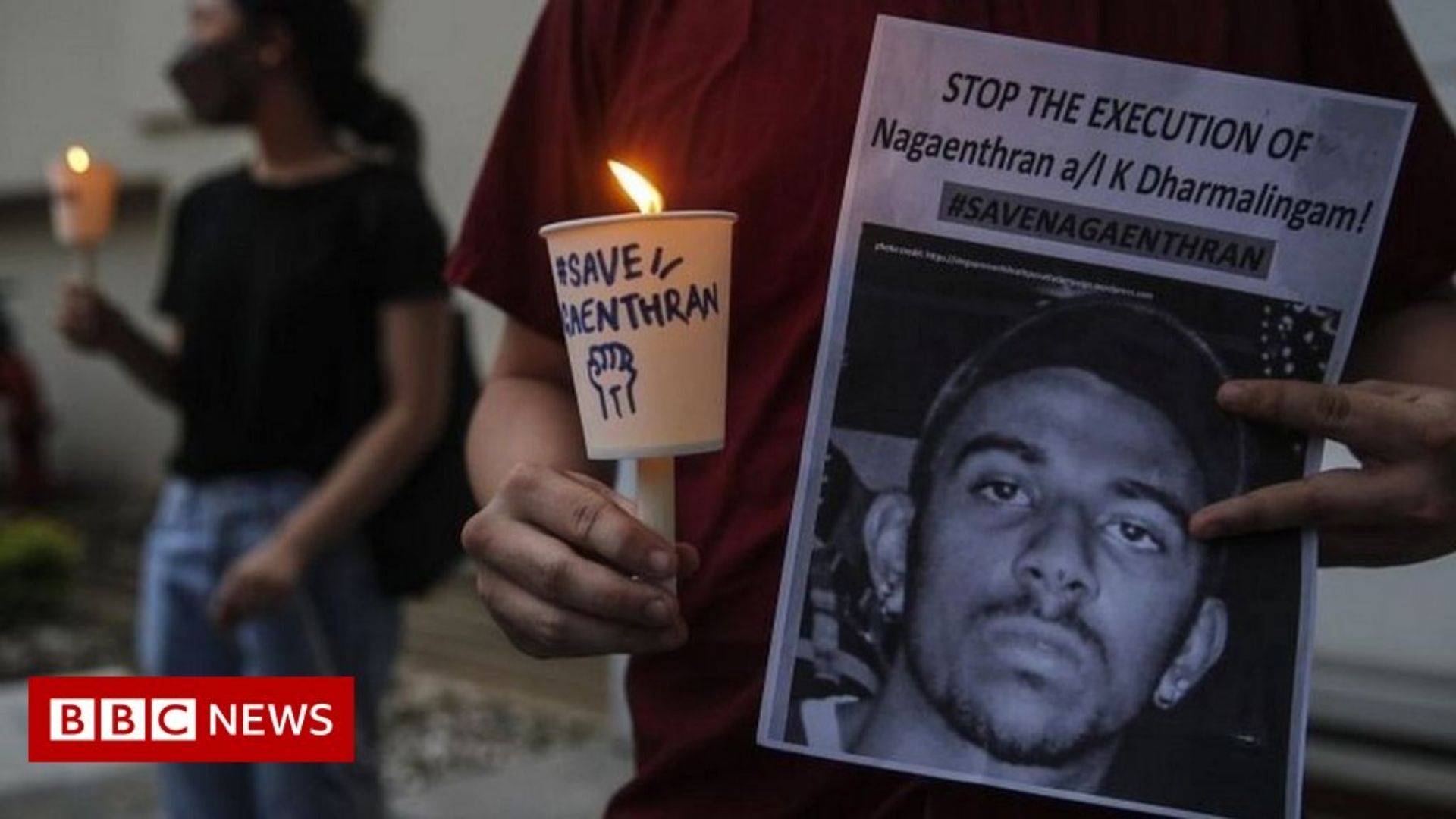(UPDATED on 27 April 2022)
Malaysian drug trafficker Nagaenthran Dharmalingam, 34, was hanged at Changi Prison at dawn on Wednesday, 27 April.
The news of his execution was confirmed by his sister Sarmila. Nagaenthran’s brother Navin Kumar told Reuters news agency that the body would be sent back to Malaysia where a funeral would be held in the town of Ipoh.
The execution came a day after the Court of Appeal dismissed an eleventh-hour effort by Naganthran’s mother to stop her son’s execution, calling the last-minute plea “devoid of merit”.
Who is Nagaenthran?
Some say he was but a mule used by drug kingpins. Others called him a drug trafficker. But Malaysian Nagaenthran Dharmalingam, 34, was still scheduled for execution in Singapore on Wednesday.
Under the Misuse of Drugs Act (MDA), if a person is found guilty of trafficking more than 15 grams of pure heroin (diamorphine) or 250 grams of methamphetamine, he or she may face the mandatory death penalty.
When Nagaenthran was arrested in 2009 at the age of 21, he had 42.72 grams of heroin strapped to his thigh — almost three times the amount stipulated by the law. He was sentenced to death by the High Court in 2010 after being convicted.
Nagaenthran had his appeals overturned – first in 2011 and subsequently in 2019 by Singapore’s highest court. His lawyers were granted a last-minute appeal where they argued that he should not be executed because he has an intelligence quotient (IQ) of 69, which meant that he had trouble making informed decisions.
Nagaenthran’s case attracted international attention
But the five-judge court of appeal underscored its long-standing position that only a change in the law could alter the country’s stance on capital punishment. Transformative Justice Collective, a group working for the reform of Singapore’s criminal justice system, said it was “profoundly disappointed”.
Nagaenthran’s case had also attracted international attention, including that of the Malaysian government, United Nations experts, the European Union and civil societies. Those who called for clemency include Malaysian King Abdullah Shah, United Nations Special Rapporteurs and the EU’s Delegation to Singapore.
Joining more than 100,000 people who signed a petition calling on President Halimah Yacob to pardon Nagaenthran in light of his intellectual disability and amid growing opposition to the death penalty in Singapore were British entrepreneur Richard Branson; English actor Stephen Fry; and disability rights activist and Chair of the Special Olympics Timothy Shriver.
Mr Branson highlighted that “Singapore has always led from the front when it comes to the rights of people with disabilities and championed their inclusion in society”, with Mr Fry adding that Nagaenthran’s execution “would cast a dark shadow on many of those commitments”.
Mr Branson also expressed his concern to both President Halimah Yacob and Prime Minister Lee Hsien Loong that the execution would pose “a great risk to your country’s reputation in the world – including its reputation in the world of business”.
Mr Fry echoed Mr Branson’s appeal for a Presidential pardon, urging President Halimah to grant clemency “in the name of compassion and mercy”, while Mr Shriver said the eyes of the world are on Singapore.

Explaining Singapore’s stance
Last November, Singapore’s envoy to the United Nations in Geneva made clear that the High Court had found Nagaenthran was of borderline intellectual functioning but did not suffer from mild intellectual disability.
Responding to a joint urgent appeal from four special UN rapporteurs, Ambassador Umej Bhatia said the High Court had, several years ago, specifically considered whether Nagaenthran met the diagnostic criteria for intellectual disability under the Diagnostic and Statistical Manual of Mental Disorders (DSM-V), which included, among other things, deficits in intellectual and adaptive functioning.
“In coming to this finding, the High Court noted that the DSM-V stated that ‘IQ test scores are approximations of conceptual functioning but may be insufficient to assess reasoning in real life situations and mastery of practical tasks’,” said Mr Bhatia, adding that among the evidence considered was the testimony of Nagaenthran’s own psychiatric expert, who agreed that he was not suffering from any intellectual disability.
In her reply to Malaysian king, Sultan Abdullah Ri’ayatuddin Al-Mustafa Billah Shah, last December, President Halimah wrote that Nagaenthran has been “accorded full due process under the law”.
Join the conversations on TheHomeGround Asia’s Facebook and Instagram, and get the latest updates via Telegram.




























